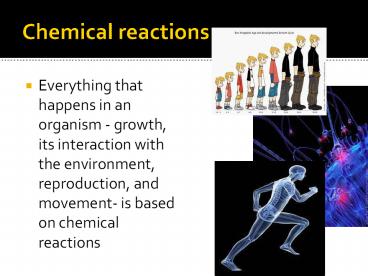Chemical reactions - PowerPoint PPT Presentation
1 / 12
Title:
Chemical reactions
Description:
Title: The Chemistry of Life Author: Brian Gillis Last modified by: EPISD Created Date: 6/24/2006 2:18:43 AM Document presentation format: On-screen Show (4:3) – PowerPoint PPT presentation
Number of Views:39
Avg rating:3.0/5.0
Title: Chemical reactions
1
Chemical reactions
- Everything that happens in an organism - growth,
its interaction with the environment,
reproduction, and movement- is based on chemical
reactions
2
Chemical Reactions
- Changes one set of chemicals into another
- Reactants - elements that enter into chem rxns
- Products - elements that are produced by chem
rxns - Chemical reactions involve breaking bonds in
reactants forming new bonds in products
3
Energy reactions
- Reactions involve energy changes
- Chem rxns that release energy-spontaneous.
- Chem rxns that absorb energy wont occur without
a source of energy
4
Energy
- Living things need energy to stay alive
- Plants-trap/store energy from sun
- Animals-get energy when they consume plants/other
animals - Humans release energy needed to grow tall, to
breathe, to think, and even to dream thru
chemical reactions that occur when we digest food - Activation energy- amount of energy needed to
start a reaction. Ex, cellulose.
5
Catalysts
- Some reactions that make life possible are too
slow or have really high activation energies to
make them practical for our bodies - These reactions are made possible by catalysts
- Catalyst- substance that speeds ? a chem rxn
- They lower a reactions activation energy
6
Enzymes
- Catalyst enzymes
- Enzymes- biological catalysts that speed up
reactions that take place in cells by ?
activation energy, thus the reaction is completed
quickly - Play essential roles in regulating chem pathways,
making materials cells need, releasing energy,
transferring info - Enzymes very specific, catalyzing 1 reaction
- They are not used up in a reaction, once done
they are free to start another process - Enzymes have an (-ase) ending in the name
sucrase breaks down sucrose, proteases breakdown
proteins, lipases breakdown lipids, DNA
polymerase builds DNA
Enzyme
7
Enzyme-Substrate Complex
Forms a complex with a substrate like a key that
unlocks the energy at the active site, required
for the reaction
This increases the speed of the reaction
enzyme
Key-substrate
Key-substrate
Enzyme activity affected by change in temp and
pH Enzymes that stop working- denatured
Active site
8
(No Transcript)
9
(No Transcript)
10
(No Transcript)
11
(No Transcript)
12
(No Transcript)































